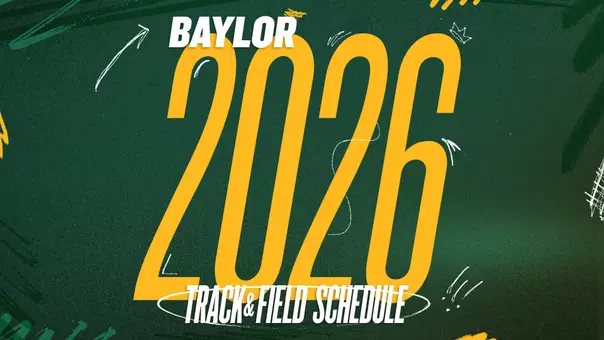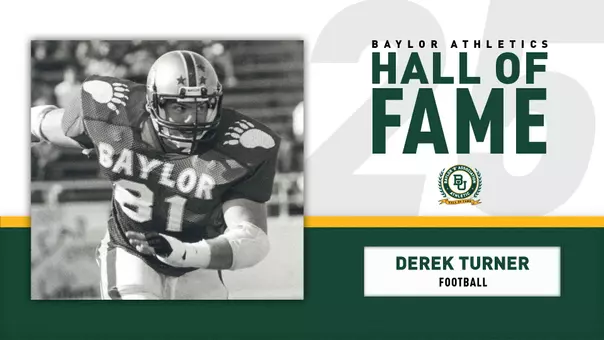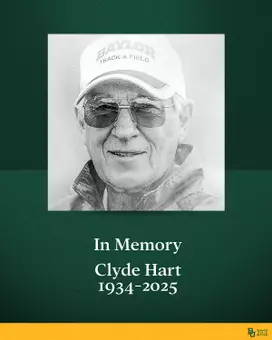
TRAILBLAZING SPRINTER
10/4/2024 12:45:00 PM | Track & Field, "B" Association
A three-time SWC champion, Allen was Baylor track’s first Black scholarship athlete
By Jerry Hill
Baylor Bear Insider
This is the fourth in a series profiling this year's inductees for the Baylor Athletics Hall of Fame, which will be posted every week at baylorbears.com.
Growing up in the "deep" East Texas town of Hughes Springs, Ronnie Allen said he "did a lot of running" because nobody had cars.
"We used to play outside, racing up and down the road," he said.
My guess is that Allen didn't lose a lot of those races. The Texas state champion in the 220-yard dash as a senior at Hughes Springs High School in 1967, Allen was a three-time Southwest Conference champion at Baylor and is part of the 2024 Baylor Athletics Hall of Fame class that will be inducted Nov. 1.
"It'll be like a big reunion with people I've known since '67, when I first got to Baylor," the 75-year-old Allen said of the Hall of Fame weekend. "A lot of them from back in the middle to late '60s, everybody that's still living is supposed to be there. They're going to be there just to support me, so I appreciate that very much."
As a freshman at the segregated all-Black Traylor High School, Allen finished last in the 220 at the 1964 Prairie View Interscholastic League state track and field meet. Maybe that's when he developed the mindset, "I didn't ever want to come in last."
"If I just beat one person," he said, "I didn't come in last."
Plagued with injuries as a sophomore and junior in high school, Allen decided to transfer from Traylor to Hughes Springs High School "as they were starting to integrate," he said.
"There was a guy up in the neighboring town of Naples, Texas, who was transferring to the integrated school, Omaha Pewitt," Allen said. "He transferred because he could get a scholarship if he went to the other school. My senior year, I went to the white school, even though we still had the Black school, because back in those days, we didn't have too many going to college."
Going from a school where he knew everybody – there were 100 students combined in the 1st through 12thgrade at Traylor - to "not knowing anybody when you get there" at Hughes Springs, Allen said it was a "different world."
"Back in those days, a lot of people showed outwards that they didn't want you there," Allen said. "So, I had to make that adjustment. And like I said, I just wanted to go to college somewhere, and I didn't have the money to go. I went up there just trying to get a scholarship."
Winning the UIL Class 2A state championship in the 220 at the 1967 meet seemed to open the right doors for Allen, who was the first Black student-athlete to earn a four-year scholarship for Baylor's track and field program.
"Basically, since nobody knew about Hughes Springs, nobody knew about me," Allen said. "I was overlooked. (Baylor coach) Clyde Hart said he was just looking over and found out that I hadn't signed with anybody. So, I guess (winning the state title) was a big thing, because he offered me a scholarship."
In a freshman year at Baylor that proved to be his best, Allen won the 220-yard dash at the 1968 SWC outdoor meet in 21.1 seconds and joined Clyde Peach, Jimmy Jasper and Jack Allen in winning the 4x110-yard relay in a school-record time of 40.6.
"I guess I just moved up a class and started running with the quote, big boys," Ronnie Allen said. "But it wasn't any big thing going from a 2A to college. You've got people from Texas, people from A&M, and you just run with them. And like I said, I didn't ever want to come in behind. I got there and got to run with them. Again, I just take everything easy, so it was no big deal to me."
At his first collegiate track meet, Allen ran a leg on the mile relay against outstanding Texas freshman Dave Morton, "who was No. 1 back in those days."
"I got the baton ahead of him, and I never let him pass me," Allen said. "I guess Coach Hart was proud, because he said I beat the No. 1 guy in the world."
The next year, Allen was a repeat conference champion in the 220 with a meet-record time of 20.7, edging Rice's Dale Bernhauer (20.8) and Texas A&M's Rockie Woods (20.9).
After those first two years, Allen suffered a pulled groin in a December 1969 practice and was never the same.
"Back then, we didn't have the medicine or the people to help you out," he said. "I went to the dorm that night, and about midnight I rushed to the Baylor clinic, where I ended up staying for six days. And I ended up losing one of my kidneys. We didn't have trainers back then, and I just never could regain that speed I had my first two years."
Starting with the City of Waco Parks and Recreation after graduating from Baylor, Allen spent more than 30 years in the recreation business and was a supervisor in the Longview Parks and Recreation department. In 1984, he received a Martin Luther King community service award.
Ronnie and his wife of 42 years, Gertrude, will be joined by family, friends and former Baylor teammates at the Hall of Fame banquet.
Joining Allen in the 2024 Baylor Hall of Fame class are Brittney Griner and Odyssey Sims from women's basketball, Ekpe Udoh from men's basketball, baseball's Michael Griffin, softball's Whitney Canion Reichenstein, football's Mark Cochran and Nina Secerbegovic from women's tennis.
The Hall of Fame banquet will be held at 6:30 p.m. Nov. 1 in the Grand Ballroom of the Hurd Welcome Center on the Baylor University campus. Tickets are $50 per person, with table sponsorships available for $600 (green level) or $800 (gold level).
Registration is available at 2024 Baylor Hall of Fame Banquet.
Baylor Bear Insider
This is the fourth in a series profiling this year's inductees for the Baylor Athletics Hall of Fame, which will be posted every week at baylorbears.com.
Growing up in the "deep" East Texas town of Hughes Springs, Ronnie Allen said he "did a lot of running" because nobody had cars.
"We used to play outside, racing up and down the road," he said.
My guess is that Allen didn't lose a lot of those races. The Texas state champion in the 220-yard dash as a senior at Hughes Springs High School in 1967, Allen was a three-time Southwest Conference champion at Baylor and is part of the 2024 Baylor Athletics Hall of Fame class that will be inducted Nov. 1.
"It'll be like a big reunion with people I've known since '67, when I first got to Baylor," the 75-year-old Allen said of the Hall of Fame weekend. "A lot of them from back in the middle to late '60s, everybody that's still living is supposed to be there. They're going to be there just to support me, so I appreciate that very much."
As a freshman at the segregated all-Black Traylor High School, Allen finished last in the 220 at the 1964 Prairie View Interscholastic League state track and field meet. Maybe that's when he developed the mindset, "I didn't ever want to come in last."
"If I just beat one person," he said, "I didn't come in last."
Plagued with injuries as a sophomore and junior in high school, Allen decided to transfer from Traylor to Hughes Springs High School "as they were starting to integrate," he said.
"There was a guy up in the neighboring town of Naples, Texas, who was transferring to the integrated school, Omaha Pewitt," Allen said. "He transferred because he could get a scholarship if he went to the other school. My senior year, I went to the white school, even though we still had the Black school, because back in those days, we didn't have too many going to college."
Going from a school where he knew everybody – there were 100 students combined in the 1st through 12thgrade at Traylor - to "not knowing anybody when you get there" at Hughes Springs, Allen said it was a "different world."
"Back in those days, a lot of people showed outwards that they didn't want you there," Allen said. "So, I had to make that adjustment. And like I said, I just wanted to go to college somewhere, and I didn't have the money to go. I went up there just trying to get a scholarship."
Winning the UIL Class 2A state championship in the 220 at the 1967 meet seemed to open the right doors for Allen, who was the first Black student-athlete to earn a four-year scholarship for Baylor's track and field program.
"Basically, since nobody knew about Hughes Springs, nobody knew about me," Allen said. "I was overlooked. (Baylor coach) Clyde Hart said he was just looking over and found out that I hadn't signed with anybody. So, I guess (winning the state title) was a big thing, because he offered me a scholarship."
In a freshman year at Baylor that proved to be his best, Allen won the 220-yard dash at the 1968 SWC outdoor meet in 21.1 seconds and joined Clyde Peach, Jimmy Jasper and Jack Allen in winning the 4x110-yard relay in a school-record time of 40.6.
"I guess I just moved up a class and started running with the quote, big boys," Ronnie Allen said. "But it wasn't any big thing going from a 2A to college. You've got people from Texas, people from A&M, and you just run with them. And like I said, I didn't ever want to come in behind. I got there and got to run with them. Again, I just take everything easy, so it was no big deal to me."
At his first collegiate track meet, Allen ran a leg on the mile relay against outstanding Texas freshman Dave Morton, "who was No. 1 back in those days."
"I got the baton ahead of him, and I never let him pass me," Allen said. "I guess Coach Hart was proud, because he said I beat the No. 1 guy in the world."
The next year, Allen was a repeat conference champion in the 220 with a meet-record time of 20.7, edging Rice's Dale Bernhauer (20.8) and Texas A&M's Rockie Woods (20.9).
After those first two years, Allen suffered a pulled groin in a December 1969 practice and was never the same.
"Back then, we didn't have the medicine or the people to help you out," he said. "I went to the dorm that night, and about midnight I rushed to the Baylor clinic, where I ended up staying for six days. And I ended up losing one of my kidneys. We didn't have trainers back then, and I just never could regain that speed I had my first two years."
Starting with the City of Waco Parks and Recreation after graduating from Baylor, Allen spent more than 30 years in the recreation business and was a supervisor in the Longview Parks and Recreation department. In 1984, he received a Martin Luther King community service award.
Ronnie and his wife of 42 years, Gertrude, will be joined by family, friends and former Baylor teammates at the Hall of Fame banquet.
Joining Allen in the 2024 Baylor Hall of Fame class are Brittney Griner and Odyssey Sims from women's basketball, Ekpe Udoh from men's basketball, baseball's Michael Griffin, softball's Whitney Canion Reichenstein, football's Mark Cochran and Nina Secerbegovic from women's tennis.
The Hall of Fame banquet will be held at 6:30 p.m. Nov. 1 in the Grand Ballroom of the Hurd Welcome Center on the Baylor University campus. Tickets are $50 per person, with table sponsorships available for $600 (green level) or $800 (gold level).
Registration is available at 2024 Baylor Hall of Fame Banquet.
Baylor Basketball (M): Obi Agbim (18 PTS) vs. Norfolk State | December 10, 2025
Thursday, December 11
Baylor Basketball (M): Dan Skillings Jr. (11 PTS) vs. Norfolk State | DEcember 10, 2025
Thursday, December 11
Baylor Basketball (M): Caden Powell (16 PTS) vs. Norfolk State | December 10, 2025
Thursday, December 11
Baylor Basketball (M): Michael Rataj (11 PTS) vs. Norfolk State | DEcember 10, 2025
Thursday, December 11



















